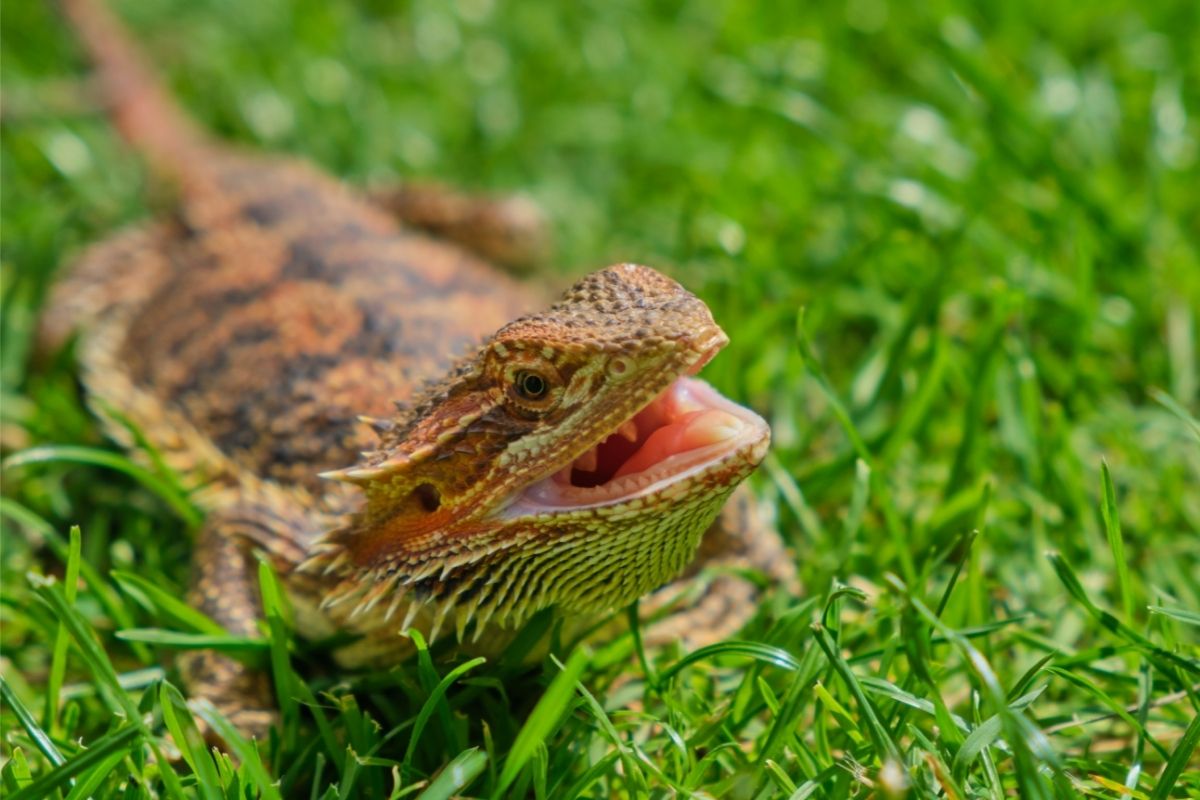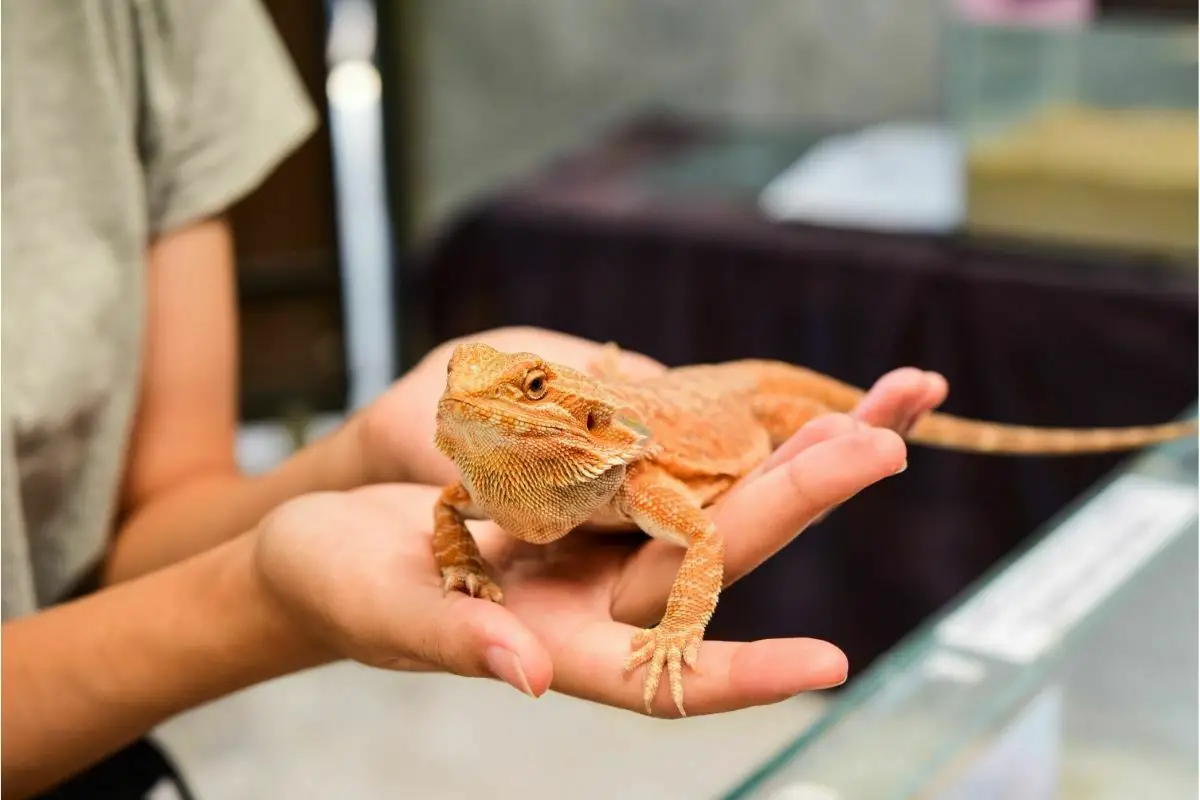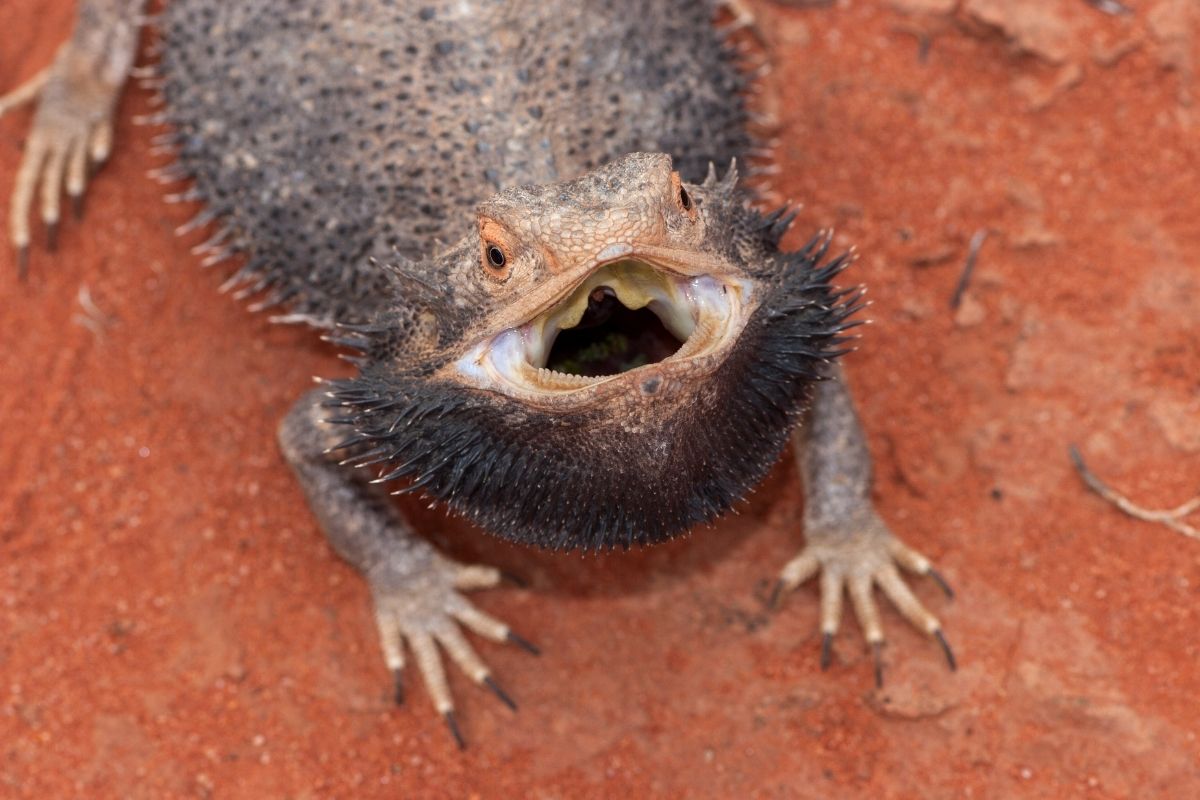Bearded dragons are easily one of the most popular forms of reptile pet that people possess around the world.
They’ve become increasingly popular as the years have gone by, and it’s clear to see why.

With their little personality traits and with how social they are with their owners, there’s no wonder that these little reptiles have taken the world by storm.
However, a lot of people don’t realize that they require a specific diet to match their needs.
These dietary needs can be down to whether your lizard needs to have certain needs met or whether it’s down to their biological features.
Many people might not know if bearded dragons have teeth or not, and you always need to understand these creatures before going out and getting one of your own.
Otherwise, you might not realize what kind of commitment owning a bearded dragon is.
Follow the rest of our guide to understand everything you need to know about bearded dragons and whether they have teeth or not.
Do Bearded Dragons Have Teeth?
The first thing that many people ask themselves when they’re thinking about buying a bearded dragon is whether or not they have teeth.
The truth is that they do, and this is something that you’ll want to keep in mind from the get-go because this will help you shape their food and their dietary needs.
If you look at any other type of reptile, you’ll find that they all have various different types of teeth.
Some species, like snakes, for example, only have four main teeth on each side, while others, such as lizards, may have more than that.
If you look at the beaked lizard, you’ll notice that they also have eight teeth on each jawline which is another way of showing that they have teeth.
However, even though they have teeth, bearded dragons aren’t able to chew their food, as well as other different types of reptiles.
This is because they lack the required muscle development that allows them to chew things properly.
Instead, they rely on their tongue to eat their food.
It’s important to note that bearded dragons still need to eat a certain amount of food every day, but they won’t be able to digest anything in particular unless they use their tongues to do so.
What Are Pleurodont Lower Teeth?
Bearded dragons have extra teeth, and they grow them out of the jawbone, much like other animals.
Their teeth are semi-socketed instead of fully socketed, which is frequent throughout reptiles.
They can regrow lost teeth, meaning that they will always have some way of eating.
Pleurodonts are very useful for eating insects and worms, which make up the majority of their diet.
They help the lizard grab the prey and pull it into the mouth.
They also use their teeth to crush the insect before swallowing it so that it is easier and quicker to eat.
What Are Acrodont Upper Teeth?
Bearded Dragons have around 30-40 sharp teeth in their upper jaws, and they’re relatively flat to help with chewing.
Their teeth are attached to the top of the upper jawbone, and they don’t grow back once they’ve reached adulthood.
However, a younger bearded dragon’s teeth grow back after they fall out, as we previously mentioned in the paragraph above.
This means an adult bearded dragon will lose their teeth if they fall out later in life due to the teeth not being able to grow back.
What Should I Feed My Bearded Dragon?
When feeding your bearded dragon, you should feed them a variety of foods, including live mealworms, crickets, grubs, waxworms, earthworms, fruit flies, mealworms, and cockroaches.
Remember that they need a high-quality protein source, which is why they love eating bugs.
They also like to eat vegetables and fruits, and they enjoy drinking water whenever possible.
Ensuring that your bearded dragon has a balanced and varied diet is important, especially when they’re young.
As mentioned earlier, they’ll start by eating insects and then move on to a wider range of food as they mature.
A good rule of thumb is to feed the same kind of food twice a week and to alternate between the two kinds of food.
How Can I Prevent Periodontal Disease?
What Is Periodontal Disease?
Periodontal disease is a condition where the gums become damaged or infected.
The gums are connected to the bones that support the teeth, and when there’s inflammation or infection in the gum tissue, this can lead to bone loss and tooth damage.
Usually, periodontal disease occurs in older animals who haven’t been cleaning their teeth, so you might want to schedule regular dental checkups and cleanings, at least with your local vet.
How To Stop Periodontal Disease
There are several ways you can prevent periodontal disease from occurring.
First of all, you can brush your pet’s teeth regularly using a soft-bristled toothbrush.
If you notice any swollen areas in the gums, you should seek veterinary treatment immediately.
You should also ensure that you keep your pet away from sugary treats and try not to let them lick their own feet.
Lastly, you should provide a safe environment for your pet, such as a terrarium.
Will My Bearded Dragon Bite Me?

Your bearded dragon won’t bite unless they feel threatened or scared.
If they do decide to bite you, try to remain calm and avoid flinching too much, so you don’t injure them.
Try to get them to release their grip on you by gently pulling them away or waiting until they let go.
As long as they feel comfortable in their environment, then you should be okay. they might also accidentally bite you if you like to feed your bearded dragon by hand.
Ensure that they don’t hurt themselves when getting them off your hand and try to learn from the experience.
How To Keep My Reptile Comfortable And Calm
A lot of reptiles tend to prefer environments that are dark and quiet. It’s best to give them a dim light, but remember that it shouldn’t be too bright.
You can use a heat lamp to warm up the room temperature, but make sure it isn’t too hot.
In addition, you should never leave a reptile unattended for too long; they need feeding and constant water so that they can thrive.
Does It Hurt If My Bearded Dragon Bites Me?
If your bearded dragon does bite you, it can hurt. However, they don’t mean it half of the time.
It will help them to develop better self-control and may even teach them how to behave around humans when being handled.
However, if they’ve already developed aggressive behavior toward people, it’s probably best not to let them near you and to keep your distance when feeding them.
Make sure that you know what behaviors you’re dealing with before allowing them to come closer to you.
When Do Baby Bearded Dragons Develop Teeth?
Baby bearded dragons usually have their first set of teeth at about 10 weeks old.
At this age, their mouths aren’t fully formed yet, which means that they cannot chew properly and need softer foods to eat.
When babies first begin to eat solid foods, they’ll only consume soft foods such as vegetables and worms because of their soft nature.
They also start drinking more often than usual because they’re growing faster and need to develop.
Will Bearded Dragons Bite Each Other?

Although some species of lizards are known for their aggressiveness towards each other, most are quite peaceful.
The main reason behind this is that they live in groups where the males compete over territory, and females choose who they mate with based on size and strength.
This doesn’t always apply to bearded dragons though, since there are many different types of them.
Some are very territorial, while others are not.
For example, the African dwarf bearded dragon has been proven to be extremely aggressive towards other bearded dragons, whereas the small-headed bearded dragon tends to stay out of trouble.
How Often Should I Check My Bearded Dragon’s Teeth?
Bearded dragons grow their teeth quickly, so you want to check them regularly throughout their lives to ensure that they’re still healthy and growing.
While they may lose one tooth during the course of the year, most of them will regrow another within a few months.
However, if they appear loose or broken, you should bring them to a veterinarian immediately.
Checking their teeth every week or so is always good practice for keeping control over their health.
What Does A Healthy Bearded Dragon Tongue Look Like?
One crucial part of a bearded dragon’s mouth health is its tongue.
Because they use their tongue to grab their food and pull it into their mouth, you want to make sure that theirs is free from any infections or wounds.
Since they feed themselves, there’s no real danger of them biting you unless you try to hand-feed them rather than placing the food in their enclosure.
Leaving the bugs or insects in their home for them to find is a good simulation of what it would be like in the wild.
A healthy lizard’s tongue is pinkish-red in color and covered by tiny scales. It’s also smooth in texture, similar to that of human skin.
Final Thoughts
In conclusion, bearded dragons do have teeth, and they need to be checked frequently.
This article provided a quick overview of your bearded dragon’s oral health and how often you should check its teeth.
In addition, we discussed the importance of brushing them, too. We hope you found this helpful!
At the end of the day, your reptile’s health is the most important thing, and you need to make sure they’re happy.
As we previously mentioned, younger beardies will often lose teeth because of natural wear and tear. However, this isn’t always a cause for concern.
These teeth will grow back and will be there for your dragon when they need to eat their food.
Frequently Asked Questions
Should You Brush Your Bearded Dragon’s Teeth?
Bearded dragons are lovable reptiles that enjoy catching bugs.
They’re also prone to tooth decay, so they must eat healthy foods and be kept in an environment with the correct temperature and humidity levels.
Bushing their teeth isn’t necessary, but vets may do this if there’s an infection or a chance of some form of gum disease.
Can Bearded Dragons Bite?
Bearded Dragons are very calm creatures that don’t bite unless they’re intimidated or scared. Their instinct is to run away.
They are very placid and won’t bite people unless they’re cornered, and there’s nowhere else to go. Bearded dragons bite because they’re hungry or angry.
They use their teeth to grab prey, and if they feel threatened, they’ll bite. They also use their teeth to chew things up and eat them.
What Are Some Common Foods For A Bearded Dragon?
Bearded dragons are omnivores, meaning they eat both plant and animal matter. Their diet consists mostly of fruits, vegetables, insects, and small mammals.
Some will also eat fish, eggs, carrion, and dead prey, depending on the species.
However, at home, you get to have control over what they eat and ensure they have a balanced and healthy diet.
